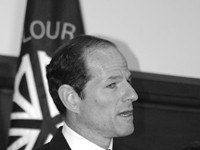[
{
"name": "500x250 Ad",
"insertPoint": "5",
"component": "15667920",
"parentWrapperClass": "",
"requiredCountToDisplay": "1"
}
]
Politics
For politicians, the first order of business after an election isn't figuring out what the results mean for the future of government but what they mean for future elections. And across the country as well as locally, politicians are already looking way ahead.
On Wednesday, Hillary Clinton victory-lapped the state in a plane on Wednesday, thanking voters for their support. But her political advisors were spinning the results with an eye toward a presidential campaign, sending reporters a pile of glowing stats. Among them: Clinton took 58 of the state's 62 counties, up from only 15 six years ago. Her margin of victory was up, too: 67 percent, compared to 55 in 2000.
Two years ago, however, Chuck Schumer got a record-setting 71 percent. He had an advantage, of course: his race coincided with the presidential election, which tends to drive the highest turnout for Democrats. But Clinton's fans were quietly hoping to come close. Her numbers last week also lagged slightly behind Eliot Spitzer's. Even though Spitzer has yet to begin his tenure as governor, he's already being talked about as a possible presidential candidate. Being overshadowed by him this year may not be the best way for Clinton to build momentum.
Still, there's no indication that any of this has dissuaded her from thinking about running for president. In the past, she's deflected questions by saying she was focused on keeping her Senate seat. Obviously she can't keep doing that now.
The Democrats' new control of the Senate also adds a wrinkle to her possible bid for the presidency. It's unclear whether the Dems' 51-seat majority will allow them to pass any substantial legislation. To do so, they will likely need to make compromises with Republicans, something Clinton is excelling at. As Josh Green recently pointed out in his excellent Atlantic profile, Clinton's ability to be effective in the legislature may work at cross-purposes with her presidential ambitions.
In the House of Representatives, the ramifications of the Democrats' victory are clearer: the Dems will find it easier than their Senate colleagues to enact bills they want.
But except for Michael Arcuri, whose district includes Geneva, that majority owes little to this part of the state. Republicans Jim Walsh, Randy Kuhl, and Tom Reynolds were all reelected, albeit by slim margins.Despite those wins, the margins must be troubling for the GOP. As little as two years ago, those three districts were considered safe. The nail-biters mean Republicans will have to work harder and worry about the possibility of strong Democratic bids two years from now.
Newly-ensconced Democrats now have the opposite worry: that their victories in typically strong Republican areas were the result of a seismic, but temporary, shift. Dems seem thrilled about the anti-Bush, anti-war, anti-GOP sentiment that swept them into power in Congress. But if this election was a referendum on the Republicans, the Dems will have a brief honeymoon. Soon, a fed-up nation will expect some results and a coherent agenda. And even if the Dems deliver, there's no guarantee that the voters will like what they have to offer. Plenty of the Democrats' new seats are in territory friendly to Republicans.
At the state level, Democrats have their own version of the same problem. At the moment they're riding high on some record-setting victory margins. And come January, for the first time in decades they'll hold all statewide elected posts. But the party --- and governor-elect Eliot Spitzer in particular --- also carries the hopes of a jaded populace seeking reform. Spitzer has proved that he can win. Now he'll have to prove that he can govern. (And it's a whole other story, but dealing with the Hevesi scandal wasn't exactly how Spitzer wanted to start off Day One.)
Spitzer's big potential obstacle is Senate Majority Leader Joe Bruno. Republicans easily held control of the Senate, meaning Bruno's now the state's top Republican. A lot will depend on whether he decides to work closely with Spitzer or play the obstructionist. The two appear to get along better than George Pataki and Sheldon Silver did, but politics is politics. It might benefit Republicans in four years if Bruno did his best to frustrate Spitzer's changes. On the other hand, that might backfire and cost some GOP state senators their seats. State Democrats have already declared their intention to win back the Senate by the end of the decade, and if voters side with Spitzer's reforms, obstruction from Republican senators might hasten that turnover.
And here at home: Steve Minarik has announced that he'll step down as state Republican Party chair. But presumably, he'll continue to run the party in MonroeCounty, and he'll enter the new year with a resurgent Democratic party on his hands.
Countywide, registered Democrats now outnumber Republicans. The City of Rochester is still the Democrats' stronghold, but their growth is starting to be reflected in the suburbs. Last week they picked up a town board seat in Gates and another in Parma, plus both of the village board seats on the ballot in Fairport.
There are county races next year --- for county executive and legislature --- but both parties are likely already focusing on controlling the legislature in 2009. Whoever does will control the redistricting process in following the 2010 Census.
Speaking of...
-
The XX Files
Nov 15, 2006 -
Reader feedback - 11-15-06
Nov 15, 2006 - More »
Latest in News
More by Krestia DeGeorge
-

The last wild Finger Lakes
Jan 17, 2007 -

Designers get their turn at downtown
Jan 17, 2007 -

From the new governor: fighting words
Jan 10, 2007 - More »





